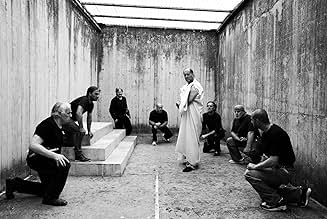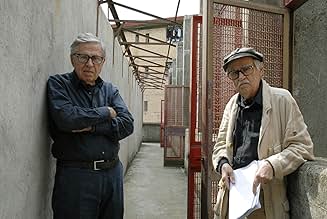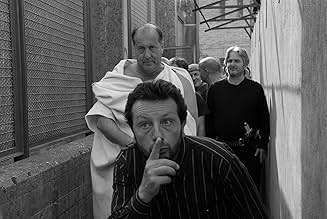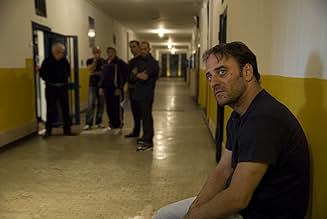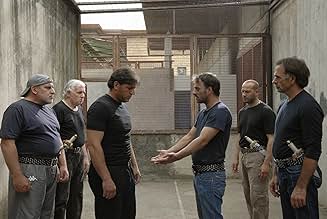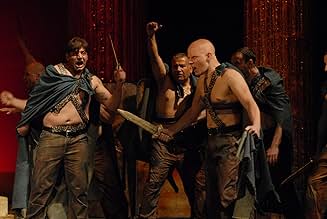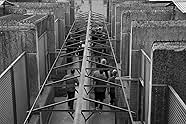AVALIAÇÃO DA IMDb
7,3/10
6,9 mil
SUA AVALIAÇÃO
Adicionar um enredo no seu idiomaInmates at a high-security prison in Rome prepare for a public performance of Shakespeare's "Julius Caesar."Inmates at a high-security prison in Rome prepare for a public performance of Shakespeare's "Julius Caesar."Inmates at a high-security prison in Rome prepare for a public performance of Shakespeare's "Julius Caesar."
- Direção
- Roteiristas
- Artistas
- Prêmios
- 16 vitórias e 21 indicações no total
- Direção
- Roteiristas
- Elenco e equipe completos
- Produção, bilheteria e muito mais no IMDbPro
Avaliações em destaque
After attending the premiere of "Cesare Deve Morire", I was not so sure about the movie. It was a good movie, but somehow essayist, rather loose, not catchy. The outstanding performance of Salvatore Striano (Brutus) was striking and rewarded by the audience. The beautiful composition of black and white pictures was of high aesthetic value. It is a very calm movie, the music is nearly minimalistic.
So how come it had a huge impact on me - later? In contrast to most other movies I had seen in Berlin, it was important. Other movies dealt with existentialistic, superficially more important topics than with some prisoners rehearsing a Shakespeare play. Yet "Cesare Deve Morire" had more to say and thus it deserved the Golden Bear. The questions it poses are the same ones as in the Shakespeare play in interrelation with the real destiny of the imprisoned play actors. Even though it is not a particularly spectacular movie, it has the tenor of what makes a strong movie: Importance. The filmmaking is of minor importance, the idea is in the foreground, which is the right decision. The play continues in our minds after the final curtain. Impressive.
So how come it had a huge impact on me - later? In contrast to most other movies I had seen in Berlin, it was important. Other movies dealt with existentialistic, superficially more important topics than with some prisoners rehearsing a Shakespeare play. Yet "Cesare Deve Morire" had more to say and thus it deserved the Golden Bear. The questions it poses are the same ones as in the Shakespeare play in interrelation with the real destiny of the imprisoned play actors. Even though it is not a particularly spectacular movie, it has the tenor of what makes a strong movie: Importance. The filmmaking is of minor importance, the idea is in the foreground, which is the right decision. The play continues in our minds after the final curtain. Impressive.
Taviani Brothers'2012 Golden Berlin Bear winner, saw the screening in this year's KVIFF, an intensely conceptual piece which recounts a play of "Julius Caesar"done by all-male prisoners. Shot entirely in Black & White, the film generates a certain art form extremity of blurring the boundary between play and film, and takes advantages of the indoor settings (which almost encompasses the entire film except for a few shots), the final result is gratifyingly diverting, both the film and the play-in-the-film.
I have only watched one Taviani Brothers' film before, ALLONSANFAN (1974, a 5/10). So I need to do more homework to comment on their style or expound on their near 60 years long walk- of-life. Simply single out this film, its artistic frontier has transcended other peers and condensed into a puristic absorption on the material itself, namely, the characters of the play and the individual prisoners who take on the roles, and strikingly their distinctions and similarities are undone in a yet refrained way. There are affluent theatrical nuisances in the film, although it only runs a scant 76 minutes, the film successfully conveys its ethos and every second counts.
Salvatore Striano stars the leading role as Bruto, his rough-edged dedication is imperfect but authentic, other supporters, the stand-outs are Cosimo Rega's Cassio and Juan Dario Bonetti's Decio, but by and large the amateur antics are put into the right place, and the absorbing original score by Giuliano Taviani and Carmelo Travia also lifts the film into a great adaption from Shakespeare's cannon. It's a true blessing to justify the fact that directors could surpass themselves even at their octogenarian years.
I have only watched one Taviani Brothers' film before, ALLONSANFAN (1974, a 5/10). So I need to do more homework to comment on their style or expound on their near 60 years long walk- of-life. Simply single out this film, its artistic frontier has transcended other peers and condensed into a puristic absorption on the material itself, namely, the characters of the play and the individual prisoners who take on the roles, and strikingly their distinctions and similarities are undone in a yet refrained way. There are affluent theatrical nuisances in the film, although it only runs a scant 76 minutes, the film successfully conveys its ethos and every second counts.
Salvatore Striano stars the leading role as Bruto, his rough-edged dedication is imperfect but authentic, other supporters, the stand-outs are Cosimo Rega's Cassio and Juan Dario Bonetti's Decio, but by and large the amateur antics are put into the right place, and the absorbing original score by Giuliano Taviani and Carmelo Travia also lifts the film into a great adaption from Shakespeare's cannon. It's a true blessing to justify the fact that directors could surpass themselves even at their octogenarian years.
The Shakespearean 'All the world's a stage' gets a new meaning with this very interesting and very different film made by the Taviani brother whose actors and heroes are individuals for which the world is the high security prison where many of them are to spend long years paying for serious crimes. Using theater as a mean of therapy end education happens in some of these prisons, now a film not only dares to make this process known and visible outside the perimeter of the prison, but also tries to make of it a work of art. The Golden Bear at the Film Festival in Berlin is a proof that the Taviani brothers succeeded to convince at least the critics and members of the jury. I get the feeling that the larger public was less convinced - it's a very interesting piece of cinema, but not one of these that attracts audiences in numbers. This is not entertainment.
In one of the introductory scenes we see a screen test. The actors-to-be are asked to introduce themselves in two situations - a 'soft' family one, and a second which demands them to feel constrained and express rage. Each of them acts with a mix of sincerity and intensity that much exceeds and compensates their lack of professionalism. This is the key of the film. We have already seen theater in theater (Shakespeare himself is the first and maybe greatest master of the genre) and theater about prisons, and many of these were already brought to screen. What we have never seen before is the mix of situations which makes the walls of the prison disappear for the ephemeral moments when the words of the ancient drama become the reality of life for the prisoners acting it.
The film asks many questions which arise after the screening ends. Julius Caesar is a play about values - honor, democracy, freedom. How do the prisoners relate to these? The characters of the play are cruel in modern terms, the plot is also about treason and murder - how do these men who have committed serious crimes relate to these deeds? Some of the most interesting moments in the play (and there are only a few of them) are these in which real life (which for the actors is life in prison) interferes in the scenes of the play. I found the smooth, sometimes unobserved, sliding of life in a 21st century prison into the political drama that took place in the first century BC to be terrifying.
And then we have the ending. The show is over, it ends in applause and ovations. Then the actors get back to what is their 'home' - the prison where most of them still have to spend many years. What we do understand is that life cannot go on without such a film changing it. The lives of the special actors in this movie, but to some extent the lives of the spectators as well.
In one of the introductory scenes we see a screen test. The actors-to-be are asked to introduce themselves in two situations - a 'soft' family one, and a second which demands them to feel constrained and express rage. Each of them acts with a mix of sincerity and intensity that much exceeds and compensates their lack of professionalism. This is the key of the film. We have already seen theater in theater (Shakespeare himself is the first and maybe greatest master of the genre) and theater about prisons, and many of these were already brought to screen. What we have never seen before is the mix of situations which makes the walls of the prison disappear for the ephemeral moments when the words of the ancient drama become the reality of life for the prisoners acting it.
The film asks many questions which arise after the screening ends. Julius Caesar is a play about values - honor, democracy, freedom. How do the prisoners relate to these? The characters of the play are cruel in modern terms, the plot is also about treason and murder - how do these men who have committed serious crimes relate to these deeds? Some of the most interesting moments in the play (and there are only a few of them) are these in which real life (which for the actors is life in prison) interferes in the scenes of the play. I found the smooth, sometimes unobserved, sliding of life in a 21st century prison into the political drama that took place in the first century BC to be terrifying.
And then we have the ending. The show is over, it ends in applause and ovations. Then the actors get back to what is their 'home' - the prison where most of them still have to spend many years. What we do understand is that life cannot go on without such a film changing it. The lives of the special actors in this movie, but to some extent the lives of the spectators as well.
Perhaps its the beautiful rolling sound of the Italian dialogue telling the story of Julius Cesar that made this enjoyable at least to the auditory sense. Perhaps it was that the language was sometimes amended to be more modern and meaningful. Perhaps it was the explained parallels of some of the prisoners experiences that helped to make the context more understandable. No matter, it was a thoroughly great way to start the Sydney Film Festival. The fact that this was a script within a script set in a prison using some real life prisoners didn't detract from anything in this film for me - I go to the cinema generally looking for a story, a fabrication, an unreality dressed in reality. I liked the gritty black and white, the sub-line of the prison life and setting. Yes, perhaps a prisoner saying he now felt caged etc didn't have to be said because it was obvious, but all in all a very enjoyable watch. I was engaged and participating from beginning to end. For me, one of the better versions of Julius/Shakespeare and a nice twist on an old but everlasting story.
A week has passed since I watched "Cesare deve morire" and I am still trying to decipher the multiple layers on which this film has worked in my mind. The brothers Taviani have directed a masterpiece of 76' which however is so dense in content that the time is waxing inside one's own memory.
The Tavianis are documenting the mis-en-scene of a Shakespeare piece inside a prison. Probably the most impressive element of "Cesare deve morire" is the performances of the inmate actors. The fact that the film is shot as a documentary in its natural setting spreads the film in two layers which are seamlessly weaved on each other. On the first level we see the prisoners who are passionately rehearsing the lines of their characters and on the second level we stand on front of Cesar, Brutus and Antonius discussing in the alleys of Rome. As in the case of Bergman, the brothers Taviani are very successfully studying the relationship between theater and cinema.
This prison setting is extremely symbolic and renders the actor performances utterly intense. It feels as if the prisoners, lacking their physical freedom, are getting deep into the skin of those new personas seeking the experiences which prison has deprived them of. The performances are so convincing that one has to contemplate on the nature of human destiny. Could it be that one's social condition or even coincidences could make the same persons capable of the best and of the worst? Moreover, the film leads to an unavoidable rumination of the concept of freedom in all its forms.
A stark black and white photography pronounces the prison architecture and recreates ancient Rome in its bare corridors. The photography is perfectly self-standing and it would be of great artistic value even in the absence of a plot. The black and white may emphasize the lack of freedom of the inmates but also allows the spectator to ignore redundant information and to concentrate on the performances of the actors. It is remarkable how architectural beauty arises even in a prison. The common spaces are illustrated exceptionally well and after a while one feels lost in a limbo between the prison and Rome.
Finally, although the audience reaches catharsis after the end of Shakespeare's narration the narration of brothers Taviani remains unresolved into ones psyche. I personally believe that "Cesare deve morire" is one of those rare cinematic experiences that are capable to shake away well entrenched beliefs. That alone would make the film worth seeing. Gladly, those 76' are so much more.
The Tavianis are documenting the mis-en-scene of a Shakespeare piece inside a prison. Probably the most impressive element of "Cesare deve morire" is the performances of the inmate actors. The fact that the film is shot as a documentary in its natural setting spreads the film in two layers which are seamlessly weaved on each other. On the first level we see the prisoners who are passionately rehearsing the lines of their characters and on the second level we stand on front of Cesar, Brutus and Antonius discussing in the alleys of Rome. As in the case of Bergman, the brothers Taviani are very successfully studying the relationship between theater and cinema.
This prison setting is extremely symbolic and renders the actor performances utterly intense. It feels as if the prisoners, lacking their physical freedom, are getting deep into the skin of those new personas seeking the experiences which prison has deprived them of. The performances are so convincing that one has to contemplate on the nature of human destiny. Could it be that one's social condition or even coincidences could make the same persons capable of the best and of the worst? Moreover, the film leads to an unavoidable rumination of the concept of freedom in all its forms.
A stark black and white photography pronounces the prison architecture and recreates ancient Rome in its bare corridors. The photography is perfectly self-standing and it would be of great artistic value even in the absence of a plot. The black and white may emphasize the lack of freedom of the inmates but also allows the spectator to ignore redundant information and to concentrate on the performances of the actors. It is remarkable how architectural beauty arises even in a prison. The common spaces are illustrated exceptionally well and after a while one feels lost in a limbo between the prison and Rome.
Finally, although the audience reaches catharsis after the end of Shakespeare's narration the narration of brothers Taviani remains unresolved into ones psyche. I personally believe that "Cesare deve morire" is one of those rare cinematic experiences that are capable to shake away well entrenched beliefs. That alone would make the film worth seeing. Gladly, those 76' are so much more.
Você sabia?
- CuriosidadesPaolo and Vittorio Taviani heard about the prisoners acting program and contacted Fabio Cavalli with the idea of doing Shakespeare's play and shot the whole experience.
- ConexõesFeatured in Film '72: Episode dated 27 February 2013 (2013)
Principais escolhas
Faça login para avaliar e ver a lista de recomendações personalizadas
- How long is Caesar Must Die?Fornecido pela Alexa
Detalhes
- Data de lançamento
- País de origem
- Centrais de atendimento oficiais
- Idioma
- Também conhecido como
- Caesar Must Die
- Locações de filme
- Empresas de produção
- Consulte mais créditos da empresa na IMDbPro
Bilheteria
- Faturamento bruto nos EUA e Canadá
- US$ 76.908
- Faturamento bruto mundial
- US$ 1.567.339
- Tempo de duração
- 1 h 17 min(77 min)
- Cor
- Mixagem de som
- Proporção
- 1.85 : 1
Contribua para esta página
Sugerir uma alteração ou adicionar conteúdo ausente


